The Shutdown’s Over. Now What?
Here’s the state of play for both parties.
Morning, all! And welcome back to work to any furloughed employees. Below, I’ll look at where things stand now that the shutdown has come to an end — for Democrats, for Republicans, for the Obamacare subsidies, the Epstein Files, government funding, and more.
Have a question about anything going on in the political sphere these days, or a broader question that’s been eating at you? Feel free to drop it in the comments, submit it here using this anonymous form, or email me at gabe@wakeuptopolitics.com. I’m planning to do a Q&A post tomorrow, and would love to answer any questions you have about politics, government, media, or anything else.
Here’s that link again. Now, let’s dive in…
At 10:24 p.m. last night, President Trump signed H.R. 5371, the Continuing Appropriations, Agriculture, Legislative Branch, Military Construction and Veterans Affairs, and Extensions Act of 2026, into law.
That’s a mouthful, but its impact is major: it means the government shutdown is over.
As the “Agriculture, Legislative Branch, Military Construction and Veterans Affairs” part of that title suggests, three of the 12 appropriations bills were fully funded by the law until September 30, 2026. And, as the “Continuing Appropriations” part suggests, programs governed by the other nine appropriations bills — the rest of the government — will be funded at their previous spending levels until January 30, 2026, staving off another shutdown at least until then.
The House approved the package in a 222-209 vote last night, with all but two Republicans in support and all but six Democrats opposed. “WE ARE SO BACK,” the official White House account wrote on X.
At 43 days, this was the longest government shutdown in history, surpassing the record set by the last funding gap, which took place during Trump’s first term in office.
The House’s return to approve the funding bill marked its first day back in regular session after a 53-day break, which was one of the longest stretches in the middle of a year the chamber has gone without meeting in a full session (and the only 40+ day break in modern House history outside of the typical legislative calendar).
Rep. Adelita Grijalva (D-AZ) was also sworn in on Wednesday, 50 days after winning a special election to take her father’s seat. As the below chart by Nathaniel Rakich shows, that is the longest a House member has waited to be sworn in this century.
“Lord, remind our lawmakers that no gold medals are given for breaking shutdown records,” Senate Chaplain Barry Black said from the chamber’s rostrum last month. It does not seem like a prayer that members of Congress kept in mind.
Regardless, the shutdown is now officially behind us. Let’s take a look at what’s coming next on a range of fronts:
Reopening: Here’s the memo from White House budget director Russ Vought telling agency heads to order their furloughed employees back to work starting today:
Although the Trump administration threatened not to give back pay to federal workers (as had been thought to be required by a 2019 law), the funding bill affirmed that they will receive the paychecks they missed; those payments will start to go out Saturday, per Semafor.
Other government services may take some time to reopen — about a week until air travel is back to normal, up to two weeks for Head Start programs to fully return, but only a few hours for SNAP benefits to resume, the New York Times reports — but the process has already begun in earnest.
The Republicans: Fairly or not, President Trump and the GOP bore the brunt of the blame for the shutdown, a reality that never really altered throughout the 43 days. (The below poll is from Navigator Research, a Democratic firm, but their findings track with non-partisan polling outfits. I’m using their chart because it shows how the “blame game” changed — or didn’t — over time.)
And there is reason to believe that the GOP exits the shutdown in a worse political position than it entered. Two weeks ago, as Trump’s polling was just starting to drop, I wrote that it wasn’t enough of a drop to take much away from it: at that point, according to the Silver Bulletin average, Trump’s net approval rating had only gone from -9.3% to -10.8% over the course of the shutdown. But it turns out that was only the start of the downturn: it’s now reached -13.6%.
That’s still not an enormous shift, but it’s a pretty stark drop that’s hard to ignore. Trump’s average approval rating (41.4%) is now the lowest it’s been in his second term — lower than “Liberation Day” — and skating dangerously close to the 30s.
It’s impossible to know whether the approval rating slide is squarely because of the shutdown, or because of a related issue, or something else entirely — Nate Silver posits here that Trump trying to fight his way out of paying SNAP benefits is what did him in — but it’s impossible to deny that the change aligns pretty neatly with the shutdown.
Regardless of the cause, Republicans clearly have a problem. This was underlined by a bruising AP/NORC poll released yesterday, which found the president’s approval rating 34 points underwater on economic issues, a record low across Trump’s two terms as president for what has historically been a strong point for him.
This places Trump roughly in the same position once occupied by Joe Biden, who also spent a fair amount of time trying to convince Americans the economy was strong even when they didn’t think so. See, for example, this recent post from the White House account, which is exactly something the Biden team would have been writing at this point in 2021. (Just substitute “Bidenomics is working!” for “THE TRUMP EFFECT!”)
And what do you know: Trump’s approval rating is roughly where Biden’s was at this point in his term. Actually, it’s a bit worse: Biden was at 43.3% at this point in 2021, per Silver Bulletin’s average, compared to Trump’s 41.4%. Per CNN, Trump is considering touring the country to give economy-focused speeches.
“White House officials have advised the president not to brush away or outright dismiss that Americans are feeling squeezed by rising prices,” the network reported, adding: “The president, meanwhile, has been personally frustrated with Americans’ perception of his administration’s handling of the economy and the media’s coverage of it.”
All of this sounding familiar yet?
The Democrats: Meanwhile, even as the president is at a political low point, the opposition party is fractured, engrossed in their own internal squabbles about whether they should have dragged the shutdown out longer to continue extracting pain from Trump — or whether doing so would have only caused pain to voters, and boomeranged back on Democrats.
Regardless of what was the right political choice, the decision was made for them by the eight Democratic senators who voted to reopen the government. That has led to a round of intraparty recriminations, mostly aimed at Senate Minority Leader Chuck Schumer (D-NY), who was not one of the eight, but is still bearing the brunt of Democratic blame for the shutdown’s end.
Still, Schumer’s job is probably safe: several House Democrats have called for his ouster, but not a single Senate Democrat, the people who actually get to vote on who serves as Senate Democratic Leader.
These internal conversations will likely continue playing out in Senate Democratic primaries, where opposing Schumer is now increasingly common (just like opposing Nancy Pelosi for speaker was in House Democratic primaries in another era). But, as far as Congress goes, the Democrats appear to have found a new issue to unite them and keep negative attention on Trump. Which brings us to…
The Epstein Files: As noted, Rep. Adelita Grijalva (D-AZ) was sworn in yesterday; she immediately became the 218th and final signature on a discharge petition to force a vote on the Epstein Files Transparency Act, which would require the Justice Department to release “all unclassified records, documents, communications, and investigative materials” in its possession related to Jeffrey Epstein.
Under House rules, that means a vote will be held on the measure no later than December — though House Speaker Mike Johnson (R-LA) has indicated that he won’t drag out the schedule and will hold the vote next week.
The vote is expected to divide Republicans, who will be caught between not wanting to take a politically risky vote and not wanting to frustrate Donald Trump. The president went all-out lobbying the four House Republicans who signed the discharge petition, urging them to withdraw their names before it was too late. Trump personally called Rep. Lauren Boebert (R-CO), one of the signatories; the White House also set up a Situation Room meeting with her, Attorney General Pam Bondi, and FBI Director Kash Patel. (Boebert kept her name on the petition.)
On Wednesday, we got a potential preview of why Trump was working behind the scenes to prevent an Epstein vote: documents released by the House Oversight Committee yesterday, which is running its own investigation, included emails from Epstein suggesting that Trump was aware of Epstein’s sexual abuse of underage girls, which Trump has denied.
“Trump knew of it. and came to my house many times during that period,” Epstein wrote in a 2019 email to himself. “Of course he knew about the girls,” Epstein wrote in another 2019 missive.
However, both messages also contain exculpatory information for Trump: “He never got a massage,” Epstein wrote of Trump in the first email; “he asked [Ghislaine Maxwell] to stop,” Epstein wrote in the second.
In a 2011 exchange with Maxwell, Epstein cryptically referred to Trump as “the dog that hasn’t barked,” because investigators hadn’t asked about the future president, adding that an unnamed woman “spent hours at my house” with Trump.
Obamacare subsidies: There was no provision related to the enhanced Obamacare subsidies in the funding bill, which means they are set to expire on December 31. Premium payments are expected to more than double for Obamacare enrollees if that happens.
As part of the deal that ended the shutdown, Senate Republicans have promised Democrats a vote on the premium tax credits, although there is no guarantee the Democratic bill will pass or receive a vote in the House. Now that the shutdown is over, negotiations are expected to begin over a potential bipartisan deal on the subsidies, which would likely involve certain tweaks to win over Republican votes.
Republican phone records: There was a last-minute kerfuffle before the House vote last night over a provision tucked into the bill by the Senate GOP (seen below) that would allow senators to sue the government for up to $500,000 if federal law enforcement agencies obtain their electronic data without alerting them.
It was recently disclosed that cellphone data of eight Republican senators was obtained as part of the FBI’s January 6th investigation; many House Republicans did not take kindly to the appearance that these senators had added a provision into the funding bill from which they would then benefit.
Ultimately, only one House Republican — Rep. Greg Steube (R-FL) voted against the package because of the provision after House Speaker Mike Johnson (R-LA) signaled that the House would hold a standalone vote next week to repeal it. Johnson told reporters that he had been “surprised and very frustrated” that it was included in the first place.
Of course, there is no guarantee the Senate will also vote on a bill to repeal the provision, which has now become law. Some of the eight senators are already planning their lawsuits: “Oh, definitely,” Sen. Lindsey Graham (R-SC) said when asked if he planned to sue. “And if you think I’m going to settle this thing for a million dollars? No. I want to make it so painful, no one ever does this again.”
Government funding: As Politico notes, the three full appropriations bills that were signed into law last night only comprise about 10% of the federal government’s $1.8 trillion discretionary budget.
The other 90% is only funded through January, which means we could be right back in a shutdown before long. Congressional leaders have yet to agree on a topline level for this spending, which makes it difficult to negotiate the individual bills.
Despite that, the Senate is expected to move ahead next week with the Defense, Labor/Health and Human Services, Transportation/Housing and Urban Development, and Commerce/Justice/Science appropriations bills.
All four of those measures passed the Senate Appropriations Committee with bipartisan support — but counterpart versions in the House are proceeding on much more divided terms, setting up another inevitable clash in the new year.




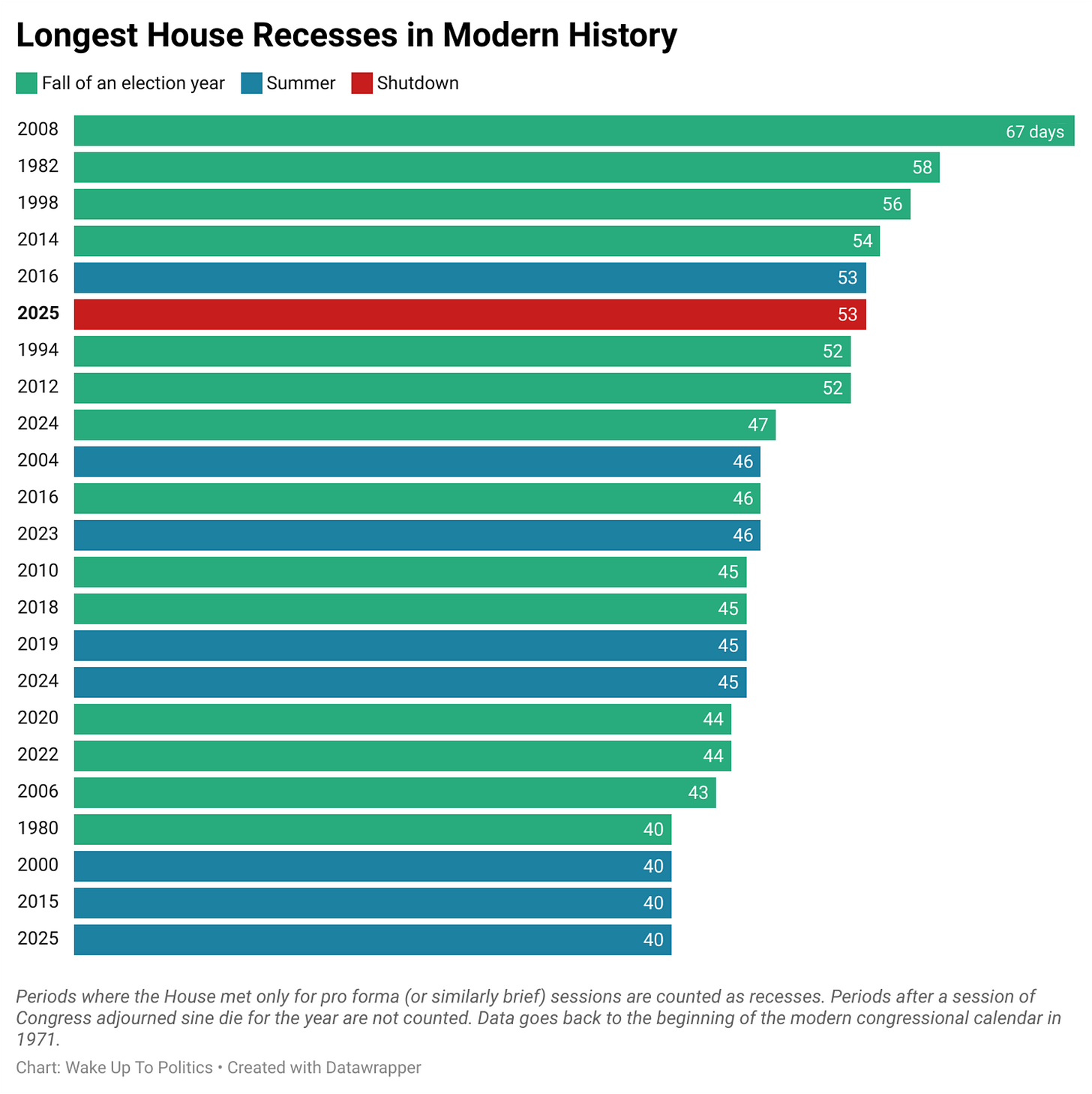
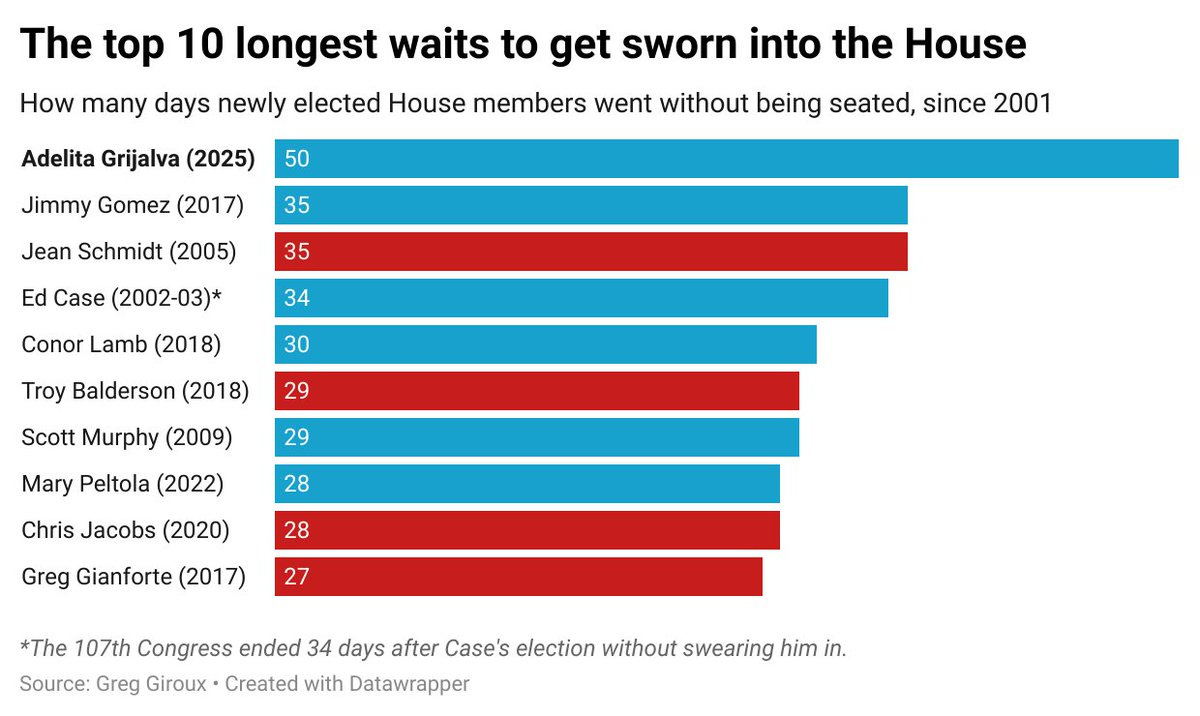
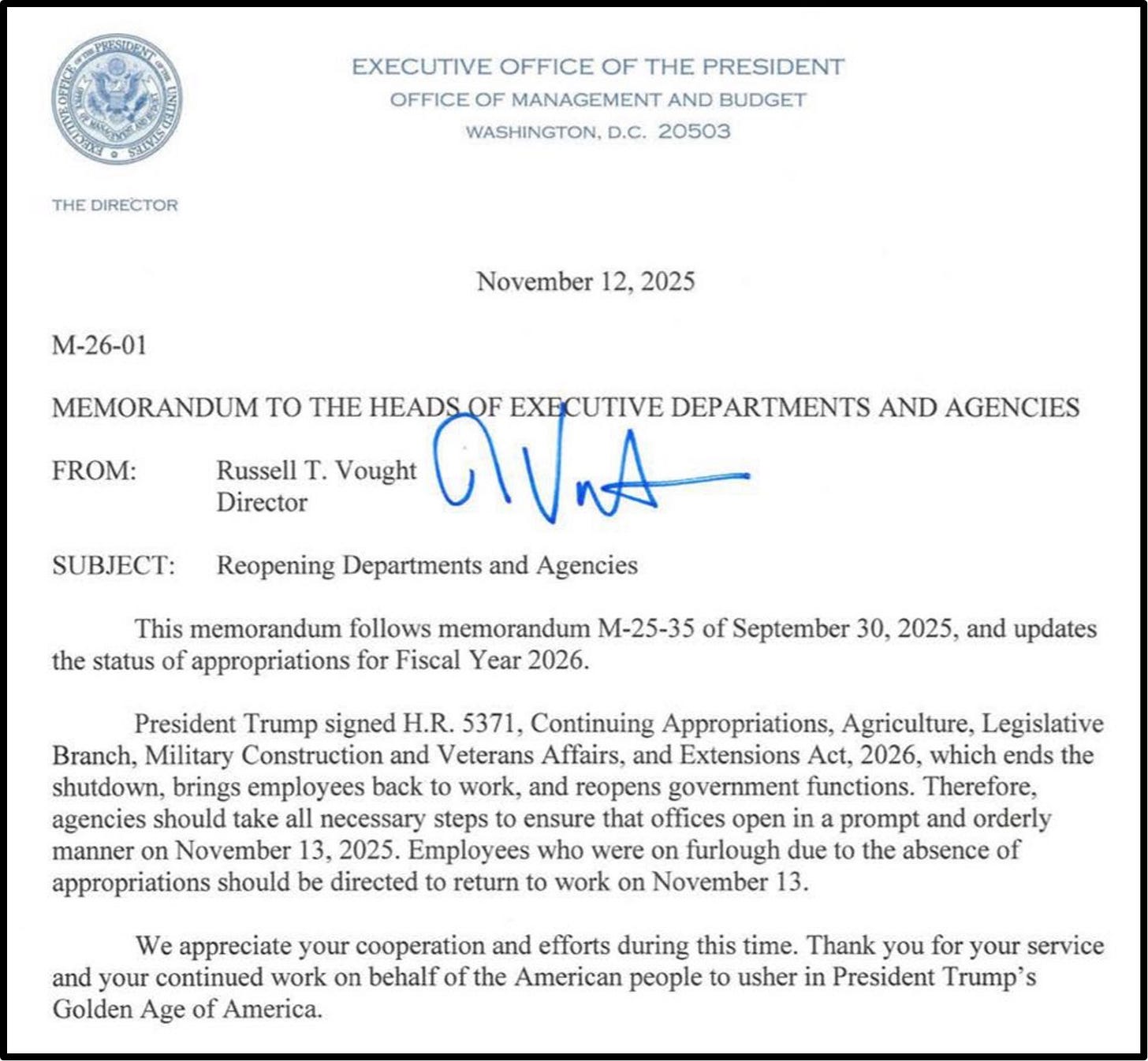
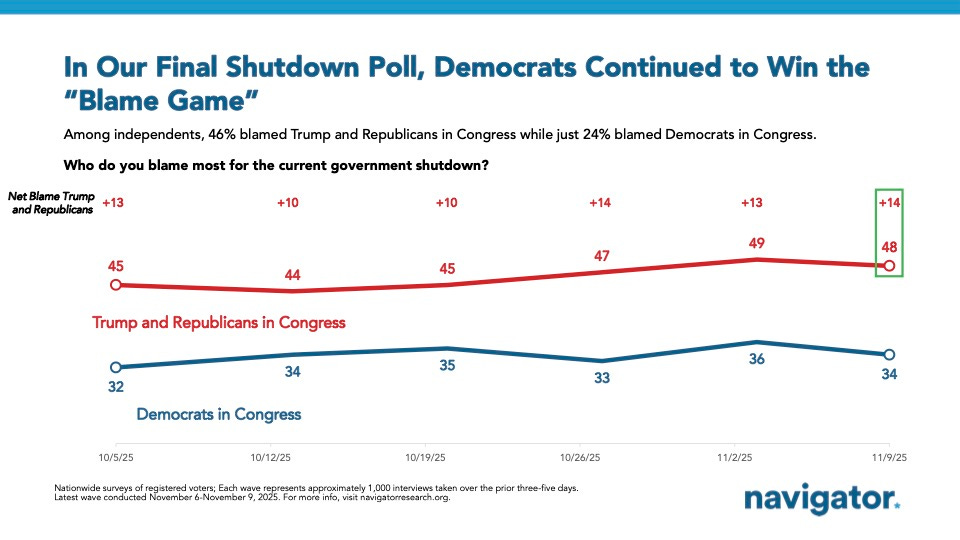
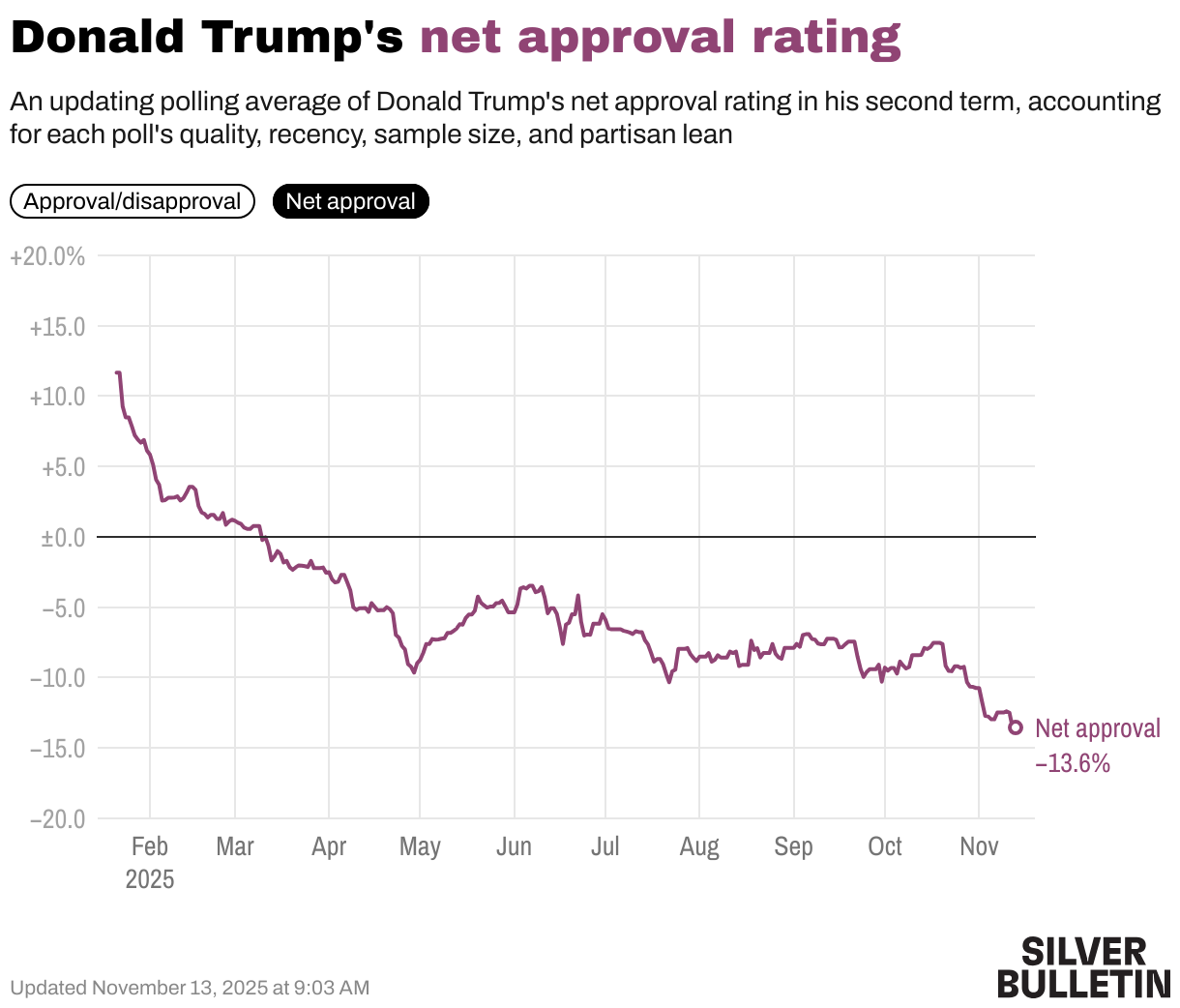
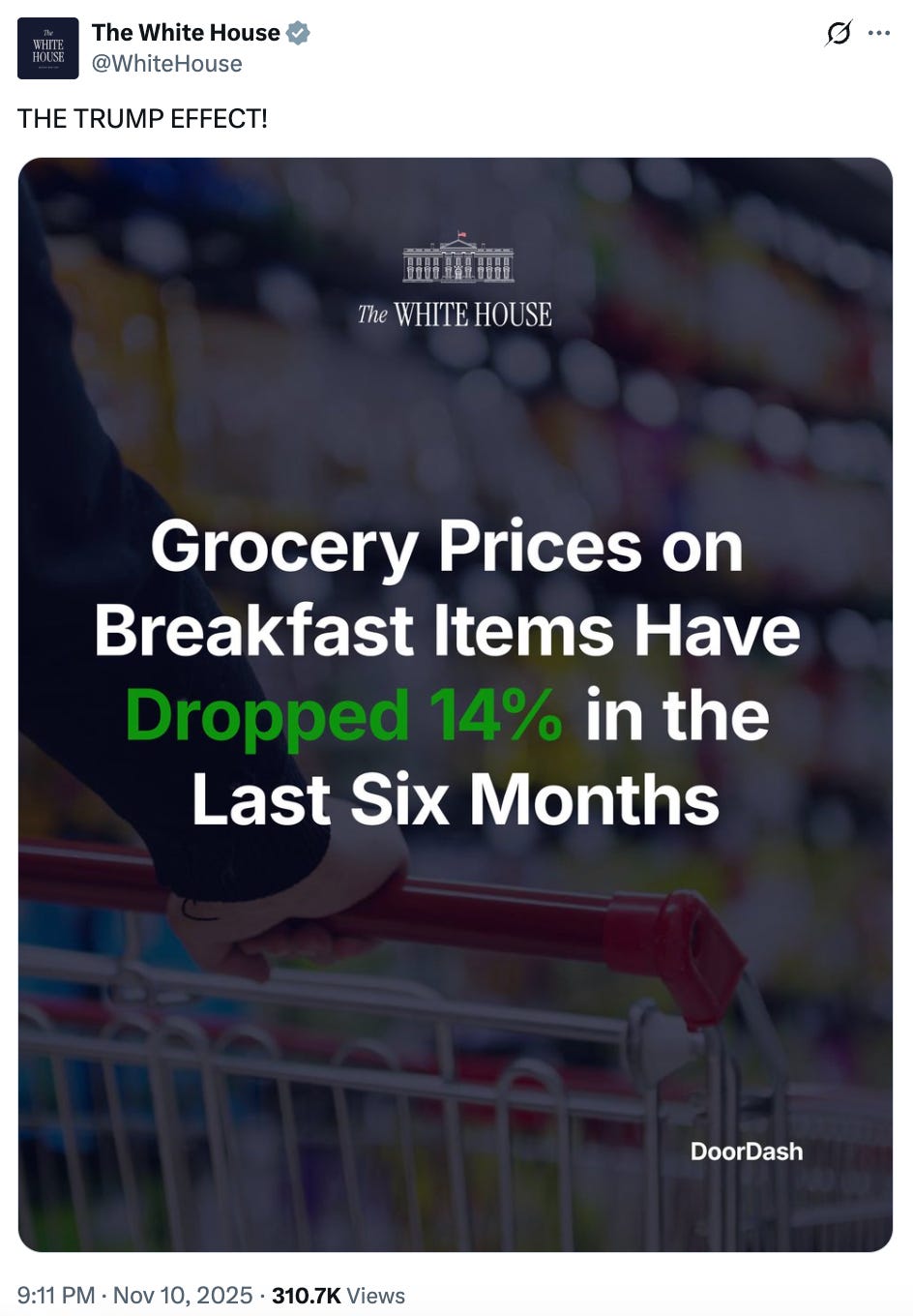
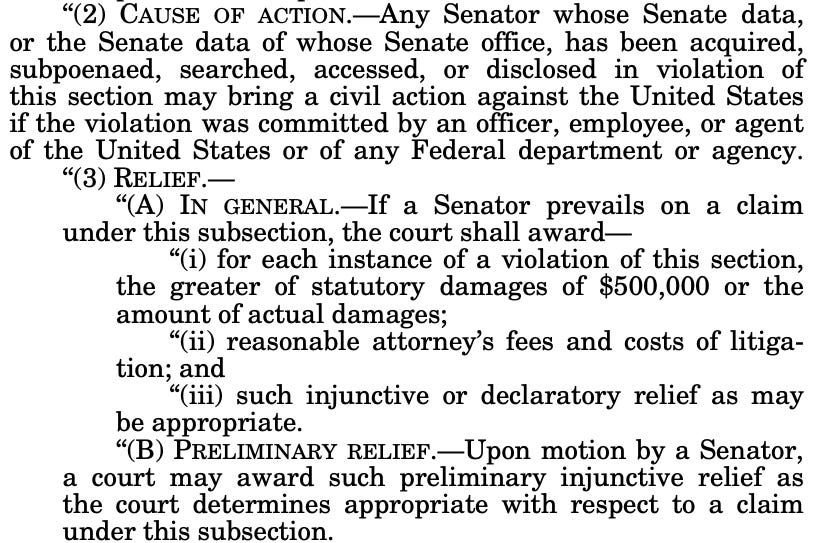
This 14% drop in prices for "Breakfast Items" purportedly due to the "Tump Effect".
It would be interesting to look into the specifics here. Mostly real food (like eggs, oats, bread...) ...or highly processed food (like pop tarts, frosted flakes, breakfast bars...)?
Gabe is there any indication Congress (or anyone else) will push for more air traffic controllers? We really need them…